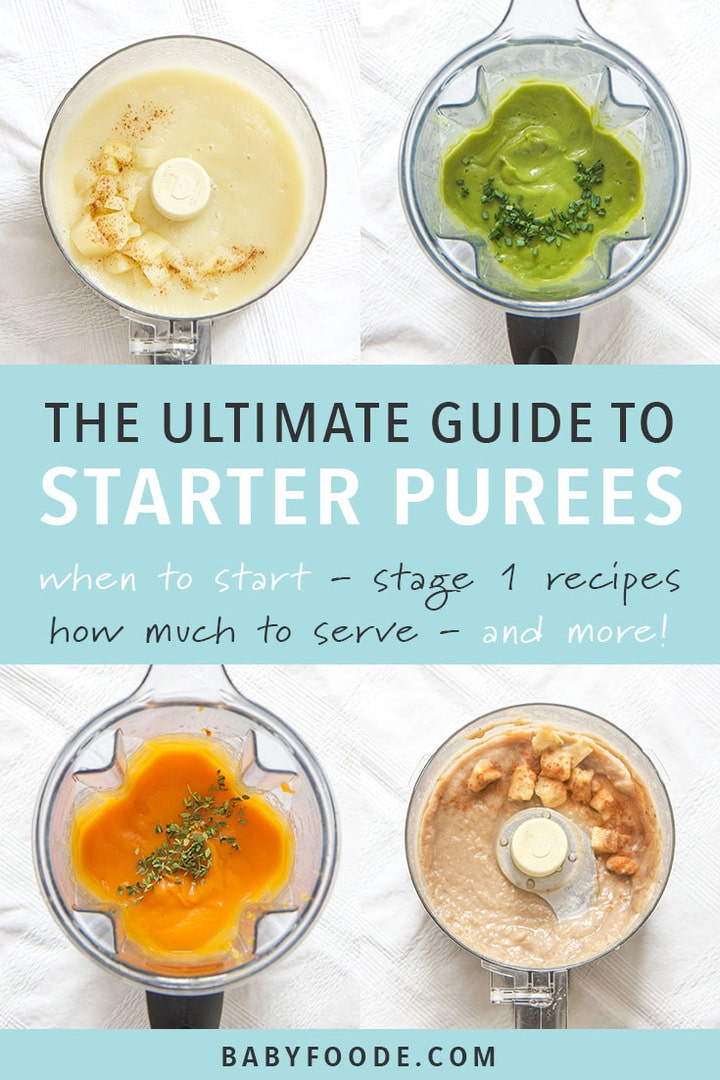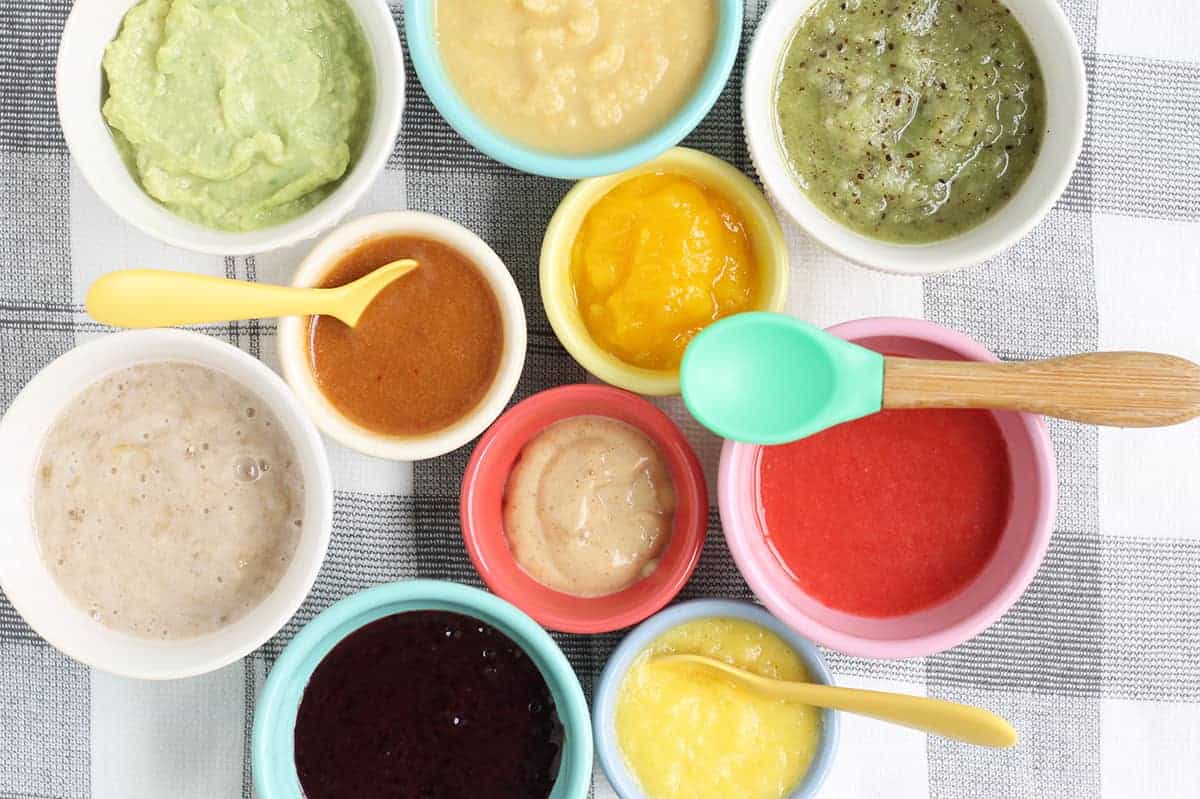As a new parent, feeding your baby can be a daunting task. You want to ensure that your little one is getting all the necessary nutrients while introducing them to the wonderful world of flavors. That’s where baby purees come in. They are a great way to introduce your baby to different tastes and textures while providing them with the nutrients they need. In this article, we have compiled a list of 10 of the best baby puree recipes that are not only delicious but also easy to make.
From sweet potato to pear and spinach to blueberry, these recipes are sure to tantalize your baby’s taste buds. Whether you are looking for a quick and easy recipe or something a little more complex, we have got you covered. So, put on your apron and get ready to whip up some delicious and nutritious baby purees that your little one will love!


10 of the Best Baby Puree Recipes for Your Little One
As a parent, you want to give your baby the best nutrition possible. One great way to do this is by introducing them to homemade purees. Not only are they packed with nutrients, but they’re also a great way to introduce your baby to new flavors and textures. Here are 10 of the best baby puree recipes that your little one is sure to love.
1. Carrot and Sweet Potato Puree
Carrots and sweet potatoes are both packed with nutrients that are essential for your baby’s growth and development. This puree is easy to make and is a great way to introduce your baby to new flavors.
To make this puree, you’ll need:
– 2 carrots
– 1 sweet potato
– Water
Peel and chop the carrots and sweet potato into small pieces. Add them to a pot with enough water to cover them. Bring the water to a boil and then reduce the heat and let the vegetables simmer for about 20 minutes or until tender. Drain the vegetables and then blend them until smooth.
Benefits: This puree is packed with vitamins A and C, which are essential for healthy eyes, skin, and immune system. It’s also a great source of fiber, which can help with digestion.
Vs: Store-bought baby food can be expensive and often contains added sugars and preservatives. Making your own purees ensures that your baby is getting fresh, nutritious food.
2. Apple and Butternut Squash Puree
Apples and butternut squash are both naturally sweet, making this puree a great way to introduce your baby to new flavors.
To make this puree, you’ll need:
– 1 butternut squash
– 2 apples
– Water
Peel and chop the butternut squash and apples into small pieces. Add them to a pot with enough water to cover them. Bring the water to a boil and then reduce the heat and let the vegetables simmer for about 20 minutes or until tender. Drain the vegetables and then blend them until smooth.
Benefits: This puree is a great source of vitamin A, which is essential for healthy eyes and skin. It’s also a good source of vitamin C, which can help boost your baby’s immune system.
Vs: Store-bought baby food can be high in sugar and preservatives. Making your own purees ensures that your baby is getting fresh, nutritious food.
3. Avocado and Banana Puree
Avocado and banana are both packed with healthy fats and nutrients that are essential for your baby’s growth and development. This puree is easy to make and is a great way to introduce your baby to new flavors.
To make this puree, you’ll need:
– 1 avocado
– 1 banana
– Water
Peel and chop the avocado and banana into small pieces. Add them to a blender with enough water to blend them smoothly.
Benefits: This puree is packed with healthy fats, which are essential for brain development. It’s also a great source of fiber, which can help with digestion.
Vs: Store-bought baby food can be expensive and often contains added sugars and preservatives. Making your own purees ensures that your baby is getting fresh, nutritious food.
4. Pea and Mint Puree
Peas are a great source of protein and fiber, making them a great addition to your baby’s diet. The addition of mint gives this puree a refreshing flavor that your baby is sure to love.
To make this puree, you’ll need:
– 1 cup of frozen peas
– A handful of fresh mint leaves
– Water
Cook the peas according to the package instructions. Drain the peas and then add them to a blender with the fresh mint leaves and enough water to blend them smoothly.
Benefits: This puree is a great source of protein and fiber, which are essential for your baby’s growth and development. The mint also has a soothing effect on the digestive system.
Vs: Store-bought baby food can be high in sugar and preservatives. Making your own purees ensures that your baby is getting fresh, nutritious food.
5. Blueberry and Spinach Puree
Blueberries are packed with antioxidants, while spinach is a great source of iron and calcium. This puree is a great way to introduce your baby to new flavors and nutrients.
To make this puree, you’ll need:
– 1 cup of fresh or frozen blueberries
– 1 cup of fresh spinach leaves
– Water
Add the blueberries and spinach to a blender with enough water to blend them smoothly.
Benefits: This puree is packed with antioxidants, which can help boost your baby’s immune system. It’s also a great source of iron and calcium, which are essential for healthy bones and teeth.
Vs: Store-bought baby food can be expensive and often contains added sugars and preservatives. Making your own purees ensures that your baby is getting fresh, nutritious food.
6. Mango and Carrot Puree
Mangoes are a great source of vitamin C, while carrots are packed with vitamins A and K. This puree is a great way to introduce your baby to new flavors and nutrients.
To make this puree, you’ll need:
– 1 mango
– 2 carrots
– Water
Peel and chop the mango and carrots into small pieces. Add them to a pot with enough water to cover them. Bring the water to a boil and then reduce the heat and let the vegetables simmer for about 20 minutes or until tender. Drain the vegetables and then blend them until smooth.
Benefits: This puree is a great source of vitamins A, C, and K, which are essential for healthy eyes, skin, and immune system. It’s also a great source of fiber, which can help with digestion.
Vs: Store-bought baby food can be high in sugar and preservatives. Making your own purees ensures that your baby is getting fresh, nutritious food.
7. Banana and Peanut Butter Puree
Peanut butter is a great source of protein and healthy fats, while bananas are packed with potassium and vitamins B6 and C. This puree is a great way to introduce your baby to new flavors and nutrients.
To make this puree, you’ll need:
– 1 banana
– 1 tablespoon of peanut butter
– Water
Peel and chop the banana into small pieces. Add the banana and peanut butter to a blender with enough water to blend them smoothly.
Benefits: This puree is a great source of protein and healthy fats, which are essential for brain development. It’s also a good source of potassium, which can help regulate blood pressure.
Vs: Store-bought baby food can be expensive and often contains added sugars and preservatives. Making your own purees ensures that your baby is getting fresh, nutritious food.
8. Pumpkin and Apple Puree
Pumpkin is a great source of vitamin A, while apples are packed with fiber and vitamin C. This puree is a great way to introduce your baby to new flavors and nutrients.
To make this puree, you’ll need:
– 1 cup of pumpkin puree
– 1 apple
– Water
Peel and chop the apple into small pieces. Add the pumpkin puree and apple to a blender with enough water to blend them smoothly.
Benefits: This puree is a great source of vitamin A, which is essential for healthy eyes and skin. It’s also a good source of fiber, which can help with digestion.
Vs: Store-bought baby food can be high in sugar and preservatives. Making your own purees ensures that your baby is getting fresh, nutritious food.
9. Broccoli and Cauliflower Puree
Broccoli and cauliflower are both packed with vitamins and minerals that are essential for your baby’s growth and development. This puree is easy to make and is a great way to introduce your baby to new flavors.
To make this puree, you’ll need:
– 1 cup of broccoli florets
– 1 cup of cauliflower florets
– Water
Cook the broccoli and cauliflower in a pot with enough water to cover them for about 10 minutes or until tender. Drain the vegetables and then blend them until smooth.
Benefits: This puree is a great source of vitamins C and K, which are essential for healthy bones and teeth. It’s also a good source of fiber, which can help with digestion.
Vs: Store-bought baby food can be high in sugar and preservatives. Making your own purees ensures that your baby is getting fresh, nutritious food.
10. Peach and Yogurt Puree
Peaches are a great source of vitamins A and C, while yogurt is packed with protein and calcium. This puree is a great way to introduce your baby to new flavors and nutrients.
To make this puree, you’ll need:
– 2 peaches
– 1/4 cup of plain yogurt
– Water
Peel and chop the peaches into small pieces. Add the peaches and yogurt to a blender with enough water to blend them smoothly.
Benefits: This puree is a great source of vitamins A and C, which are essential for healthy eyes, skin, and immune system. It’s also a great source of protein and calcium, which are essential for healthy bones and teeth.
Vs: Store-bought baby food can be expensive and often contains added sugars and preservatives. Making your own purees ensures that your baby is getting fresh, nutritious food.
Frequently Asked Questions
Here are some common questions and answers about the 10 best baby puree recipes:
1. What are the 10 best baby puree recipes?
The 10 best baby puree recipes include sweet potato puree, apple and pear puree, carrot and parsnip puree, avocado puree, pea and mint puree, butternut squash puree, blueberry puree, banana and oatmeal puree, spinach and broccoli puree, and mango puree. These purees are easy to prepare and packed with nutrients that are essential for your baby’s growth and development.
You can make these purees at home using fresh ingredients and a blender or food processor. They are a great way to introduce your baby to different flavors and textures while ensuring that they get the nutrients they need.
2. When can I start giving my baby purees?
You can start giving your baby purees when they are around 4-6 months old. At this age, babies are ready to start eating solid foods and purees are a great way to introduce them to new flavors and textures. It’s important to start with simple purees and gradually introduce more complex flavors and textures as your baby gets older.
When introducing new foods to your baby, it’s important to watch for any signs of allergies or intolerance. Start with small amounts and gradually increase the serving size as your baby gets used to the new food.
3. What are the benefits of giving my baby purees?
Giving your baby purees has many benefits. Purees are easy to digest and provide your baby with essential nutrients such as vitamins, minerals, and fiber. They also help your baby develop their taste buds and get used to different flavors and textures.
Purees are also a great way to introduce your baby to a variety of fruits and vegetables, which can help prevent picky eating habits later on. By making your own purees at home, you can ensure that your baby is getting fresh, nutritious food without any added sugars or preservatives.
4. Can I freeze baby purees?
Yes, you can freeze baby purees for later use. Simply spoon the puree into ice cube trays and freeze until solid. Once frozen, transfer the puree cubes to a freezer-safe container or bag and label with the date and type of puree.
When you’re ready to use the puree, simply thaw the desired amount in the refrigerator overnight or in a bowl of warm water. Avoid using the microwave to thaw purees as it can create hot spots that can burn your baby’s mouth.
5. How can I make sure my baby is getting all the nutrients they need?
It’s important to offer your baby a variety of foods to ensure that they are getting all the nutrients they need. In addition to purees, you can offer your baby soft, mashed foods such as banana, avocado, or scrambled eggs.
As your baby gets older, you can gradually introduce more complex foods such as cooked vegetables, fruits, meats, and grains. It’s important to watch for any signs of allergies or intolerance and to consult with your pediatrician if you have any concerns about your baby’s nutrition.


BABY FOOD MEAL PREP | Homemade Purees + Free Downloadable Guide!
As a professional writer, I understand the importance of providing valuable information to readers. And what could be more valuable than a collection of the best baby puree recipes? Feeding your little one can be a daunting task, especially when they are transitioning to solid foods. But with these 10 delicious and nutritious puree recipes, you can rest assured that your baby is getting the best possible start to their food journey.
From sweet potato and apple puree to avocado and banana mash, these recipes are not only easy to make but also packed with essential nutrients that your baby needs for healthy growth and development. Whether you’re a first-time parent or a seasoned pro, these puree recipes will make mealtime a breeze and keep your baby happy and satisfied.
So go ahead and give these recipes a try, and watch your baby’s taste buds develop and their appetite grow. With these 10 best baby puree recipes, you can be confident that you are providing your little one with the best possible start to their food journey.



